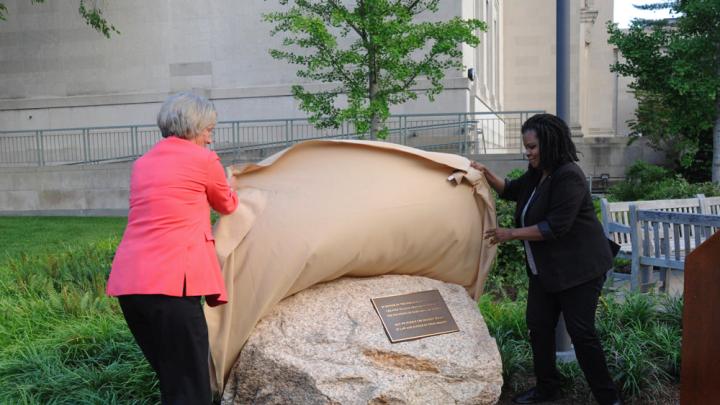President Lawrence S. Bacow emailed the community on November 21 to announce an “initiative on Harvard and the legacy of slavery,” backed by an initial $5 million in funding and overseen by a faculty committee led by Radcliffe Institute dean Tomiko Brown-Nagin, Paul professor of constitutional law and professor of history. This interdisciplinary, Harvard-wide initiative follows:
- the 2016 ceremony at which a plaque commemorating the enslaved people who once lived there was placed at Wadsworth House (in part because of student-inspired research overseen by Bell professor of history Sven Beckert—a member of the new committee);
- Harvard Law School’s coming to terms with its connections to plantation owner (and benefactor) Isaac Royall Jr., himself a slaveowner; and
- Radcliffe hosting a major conference on Harvard and slavery.
Bacow’s announcement said the University initiative will “build on the important work undertaken thus far, provide greater structure and cohesion to a wide array of university efforts, and give additional dimension to our understanding of the impact of slavery. This work will allow us to continue to understand and address the enduring legacy of slavery within our university community.”
Brown-Nagin and Radcliffe, he continued, “will also anchor a range of programmatic and scholarly efforts within this new initiative,” which “will have a strong grounding in rigorous research and critical perspectives that will inform not only our understanding of facts, but also how we might address the ramifications of what we learn.” The initiative “will concentrate on connections, impact, and contributions that are specific to our Harvard community. Harvard has a unique role in the history of our country, and we have a distinct obligation to understand how our traditions and our culture here are shaped by our past and by our surroundings—from the ways the university benefitted from the Atlantic slave trade to the debates and advocacy for abolition on campus.”
Finally, “the initiative will provide opportunities to convene academic events, activities, and conversations that will encourage our broader university community to think seriously and rigorously about the continuing impact and legacy of slavery in 2019 and beyond. Over the course of Harvard’s four-century history, the composition of our community has changed and evolved, becoming more diverse and more inclusive. This emphasis will help us build on efforts through the Office for Inclusion and Belonging and across the Schools, to ensure that discussion and understanding about our past can help us think differently and move us ever closer to a Harvard where all of us can thrive.…It is my hope that the work of this new initiative will help the university gain important insights about our past and the enduring legacy of slavery—while also providing an ongoing platform for our conversations about our present and our future as a university community committed to having our minds opened and improved by learning.”
Joining Brown-Nagin and Beckert on the presidential committee are:
- Paul Farmer, Kolokotrones University Professor;
- Annette Gordon-Reed, Warren professor of American legal history and professor of history;
- Evelynn Hammonds, Rosenkrantz professor of the history of science and professor of African and African American studies (a former dean of the College);
- Meira Levinson, professor of education;
- Tiya Miles, professor of history;
- Martha Minow, 300thAnniversary University Professor (former Law School dean—her current book is reviewed here);
- Maya Sen, professor of public policy;
- Daniel A. Smith, lecturer on ministry studies;
- David R. Williams, Norman professor of public health; and
- William Julius Wilson, Geyser University Professor emeritus.
In disseminating the announcement, the University news office said it would have no further comment beyond Bacow’s message and an accompanying statement by Brown-Nagin, so it is not clear what led to the initiative. As noted above, it is consistent with recent Harvard efforts to understand and acknowledge its past connection to slavery—a strong interest of past president Drew Gilpin Faust, an historian of the antebellum South—and of course sustains all recent presidents’ (and Bacow’s) outspoken support for diversity and inclusion.
In the wider academic world, past connections to slavery remain very much a live issue. In the most recent, vivid example, Georgetown University committed to raise $400,000 annually to aid descendants of the 272 slaves who were sold to support the institution in the early 1800s—a form of reparations, which are being discussed on other campuses as well.
Closer to home, the College’s decision not to reappoint Ronald S. Sullivan Jr. and Stephanie R. Robinson as faculty deans of Winthrop House last spring became racially charged when he alleged that bias was involved. And of course the protracted (and thus far unsuccessful) litigation challenging Harvard College’s admissions procedures focused on Asian-American applicants, directing attention away from the earlier, emerging conversation about the University, slavery, and its contemporary legacies.
In focusing anew on Harvard’s slave connections, Bacow, who has devoted much of his presidency to efforts to enhance external perceptions of higher education—and to demonstrate the benefits of Harvard’s research and teaching to the wider society—is making a decisive statement about internal discourse and an inward-looking inquiry. And he is accompanying that decision with substantial financial resources—distinguishing this announcement from those accompanying recent academic initiatives spanning fields from quantum science and quantitative biology to inequality in America.







